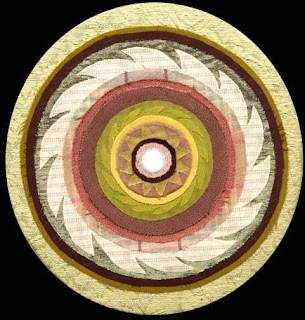If you come across something that does not spark joy
but that you just can't bring yourself to throw away,
stop a moment and ask yourself, 'Am I having trouble getting rid of this because of an attachment to the past or because of a fear for the future?'–Marie Kondo, The Life-Changing Magic of Tidying Up
 |
| 'Just In Case' drawing (markers) by Jude Spacks |
As Kondo-san says, attachment to the past can make decisions murky. But what is this 'past' I find myself clutching on to, related to some forsaken item? A memory, an outdated plan, a storyline, a shifting mental position which reality has already left behind.
 |
| 'Attaching to Past Thought' cartoon by Jude Spacks |
"The worst thing that can happen is a thought."--Byron Katie
Fear for the future happens in the imagination, too, like the past does. It is an uncomfortable current thought-form, no matter how valid its predictions.
Future-fear seems to be trying to protect me from experiencing thought-feelings that might or might not show up in reaction to things that may or may not occur. I doubt it helps much to prepare for what may actually happen later on–I'm more likely to be resourceful in the unknown future moment if I'm not weighted with anticipatory worry.
Future-fear seems to be trying to protect me from experiencing thought-feelings that might or might not show up in reaction to things that may or may not occur. I doubt it helps much to prepare for what may actually happen later on–I'm more likely to be resourceful in the unknown future moment if I'm not weighted with anticipatory worry.
Trying to make the 'right' decisions now to keep myself from thinking unhappy thoughts later is a tense, defensive way to live. It's a neat, self-fulfilling, often unconscious, theory that if I do the 'right' thing I get to feel good, but if I make a mistake, I'll have to feel bad.
Do thoughts (and the feelings they bring) really play by these rules?
For
instance, sometimes I see with hindsight that I made a regrettable
choice and yet still feel just fine, knowing I did the best I could at
the time. Sometimes I give myself a hard time with no justification whatsoever from
'mistakes'. Things happen that aren't what I imagined I wanted and I may still enjoy a clear, open, grateful mind about them–or, not.
 |
| 'JoySpark Thought?' cartoon by Jude Spacks |
Thought-feelings will come and go, including thoughts that call choices good or bad. Thoughts take available evidence about circumstances and spin it however they do, and, so what? Why take them so seriously? Keep what sparks joy, for now.
“I think 99 times and find nothing.
I stop thinking, swim in silence, and the truth comes to me.”
--Albert Einstein
 |
| 'Blue Thought' cartoon by Jude Spacks ____________________________________________________________________________________ Want to have a happier relationship with your own thinking? Check out whether a coaching conversation might be just-right support for reconnecting with your own wisdom and commonsense. ______________________________________________________ Here's another post on liberation from self-government by Bogus Thought Laws: Woman Stops Braining Herself With Carrot Stick ______________________________________________________ |














